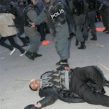
KERIMLI BATTLE-CRY SPARKS MELEE IN BAKU
Publication: Eurasia Daily Monitor Volume: 2 Issue: 220
By:

An emotional outburst by Popular Front of Azerbaijan Party (PFAP) leader Ali Kerimli, urging confrontation with the police, turned the opposition’s lawful, peaceful November 26 post-election protest rally into a violent melee with the Baku police. Kerimli’s rhetoric differed markedly from that of Musavat Party leader Isa Gambar, whose speech called for caution, law-abiding tactics, and not giving the police any reason for using force.
Shortly before the expiry of the 5pm deadline to end the three-hour authorized rally in Galaba Square, Kerimli suddenly urged the participants to stage a sit-in, preparatory to installing tents in the square. He obliquely appealed to participants’ sense of manhood: “If you are afraid of [police] batons, can you then fight in the war?” [presumably to retake Karabakh from Armenia]. ‘No!’ the crowd answered as supporters began to sit in” (ISN Security Watch, November 26). Sardar Jalaloglu, who operates the Democratic Party for the wanted Rasul Guliyev, called out in a similar vein: “The nation expects heroism from you!” (APA, November 26). Another orator, Shiite imam Ilgar Ibrahimoglu, seemed to urge a replay of 1979 Iran in Azerbaijan: “We are not going to tolerate the Shah’s regime!” (Turan, November 26). By 5pm some participants started a sit-in, and a group began installing two tents, with more likely to follow.
Five minutes after the deadline’s expiry, and after due warnings, the police intervened with excessive force to clear the square. Many rally participants were brutally beaten, with scores injured. The independent ANS Television, Azerbaijan’s most popular channel, showed graphic scenes of the police violence. Such response was fully predictable for three reasons: The police lack modern training in crowd-control; the authorities — faced with inflammatory rhetoric about a “color revolution” and “flash-mobbing” tactics — are determined to prevent any seizure of public squares and installation of tent cities; and the protest leaders in this case breached their own earlier assurances to Baku police that they would not call for sit-ins or erecting tents.
Azerbaijani opposition leaders’ tactical decisions often reflect internal rivalries even as the opposition struggles against the authorities. In this case, a division emerged within the radical opposition’s councils during the week that preceded the November 26 rally. Gambar and other Musavat leaders cautioned against resorting to sit-ins or tent-city protests and continued to call for dialogue with the authorities. This prompted some opposition circles and local observers to suspect that Gambar was seeking a separate deal with the authorities over re-allocation of parliamentary seats through recounts in the disputed electoral districts.
While the opposition as a whole is acutely conscious of its loss of internal momentum and international attention, the more radical circles drew conclusions that differed from Gambar’s. PFAP figures around Kerimli (who controls the orange-clad youth activists, the potential tent-city protesters) felt that a decisive move was urgently necessary to restore credibility through sit-in and tent-city protests. These discussions became “Baku’s worst-kept secret” in opposition circles and among local observers during the week before the rally. Word went out to selected international media (almost all of whose correspondents had left Azerbaijan after the elections) to return to Baku for the November 26 event.
At a news conference he led after the melee, Kerimli used the event to support the irreconcilable opposition’s pre-determined conclusions: “Now the world’s democracies will not be able to say without shame that these authorities are becoming more democratic through reforms … The whole world sees that Azerbaijan’s dictatorship cannot be reformed. From now on, Western diplomats will no longer be able to talk about possible reform of these authorities.” Gambar, however, declined to take part in the news conference: “Everyone witnessed my speech and the other speeches at the rally and can draw their own conclusions,” he told other journalists.
The U.S. Embassy issued a statement “deplor[ing] the unjustified and unprovoked use of force against the citizens’ right of assembly” — an interpretation that seems to overlook the actual provocation and breaches of law, and that may reflect not only the political climate of Baku but also that of Washington. The British Embassy, however, issued a balanced statement “urg[ing] all parties to exercise maximum restraint. The opposition should exercise freedom of assembly within the law, and the authorities should ensure safe conditions for this” (Turan, November 26). It is widely believed that Western embassies in Baku are quietly telling the radical opposition to observe the law and refrain from any confrontational tactics while the election returns are being reviewed. Apparently, this advice needs to become more loud and clear in order to be heeded.
(Turan, Trend, APA, ANS TV, ISN Security Watch, AFP, November 25-27; New York Times, November 26)




